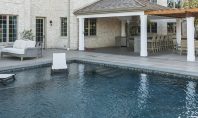Ultimate Pools

When the summer sun is blazing, and the humidity is high, few other things are as refreshing as a splash in your own backyard pool. Adults and kids alike enjoy the convenience, and the just-plain-fun of a private paradise.
Whether your dream is an in-ground or above-ground pool, it’s a project with lots of moving parts. Here are some keys factors to consider.
LEARN THE CODES.
Every area has building codes, so investigate them first. Restrictions on zoning, utilities, proximity to property lines, and many other rules can impact your plans.
CHOOSE YOUR STYLE AND SHAPE.
If you’re eager to get set up, a relatively simple above-ground pool might be the answer; in-ground versions are, of course, more complex and more expensive. Circles and rectangles are common above-ground shapes, while in-grounds can take practically any form. Be sure to measure and evaluate your property—its available space and its terrain can influence your final choice.
WATCH YOUR BUDGET.
According to industry reports, the national average cost of an above-ground pool is nearly $17,000 (including installation); in-grounds average nearly $50,000. Of course, you’ll have to factor in chemicals, electricity, water, special features, and any preliminary grounds-keeping.
SHOP OFF-SEASON.
If installing a pool is on your wish list, start planning early. You can probably find some bargains when the weather is cold. Committing early can also put your project at the top of the contractor’s future schedule, increasing your chances of being ready to dive in on the first hot day of summer.
TALK TO YOUR INSURANCE AGENT.
Pools are fun, but they can also increase your liability. Check with your agent to be sure you’re adequately covered, and ask about ways to mitigate your risk (and your premiums!)—locked gates, fences, and removal of access ladders, for example. “No trespassing” and “Swim at your own risk” signs just won’t cut it.
ASK QUESTIONS. THEN ASK SOME MORE.
Not every pool contractor is created equal, so don’t hesitate to grill your bidders about their capabilities and experience. Insist on seeing references from other satisfied customers; you might even be able to contact some of them.
Be sure your contractor is fully certified, and carries worker’s comp and liability insurance. Ask about a workmanship warranty—it should cover things like leaks in plumbing and fitting as well as ground settlement.



























